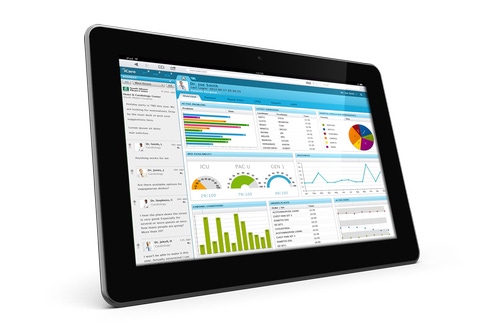Athenahealth brings care coordination app to hospitals, while startup iCare aims to take "cloud VistA" beyond academic trials.


10 Waiting Room Apps That Engage Patients
10 Waiting Room Apps That Engage Patients (Click image for larger view and slideshow.)
To the extent cloud-based electronic health records (EHR) systems have won success, they have so far done it in the physician-practice market rather than with inpatient systems for hospitals. At this week's HIMSS Conference, Fort Lauderdale-based cloud EHR startup iCare will for the first time be actively courting enterprise customers for cloud apps that put an HTML5 front end on the established government open source VistA system. Athenahealth is also showing its ambitions to capture the hospital market, although so far with a care-coordination module it says will work with any EHR rather than its own AthenaClinicals EHR.
I met with iCare prior to the conference for a demo of its web and mobile apps. With refreshing modesty, chief marketing officer Don Cook acknowledged the product is probably not ready to run the operations of a big hospital yet -- "probably an under-100 bed facility would be our sweet spot" -- and will need to win the imagination of a daring hospital CEO, willing to try something new.
"We know we're not ready to take over the world yet, but we're ready for the world to see it," he said. iCare showed its product at HIMSS last year but initially sought adoption in academic settings, where medical informatics schools were seeking a product for their students to experiment with. The company was founded by the creators of Learn.com, a cloud-based learning management platform that was acquired by Taleo in 2010 and subsequently absorbed into Oracle, and is hiring to build its health IT expertise.
[Are you ready for the convergence of patient data, social platforms, and analytics? See HIMSS14 Preview: Enabling Today's Digital Doctor.]
Most of the credibility for the iCare platform comes from incorporating the decades of work invested in VistA, which was originally developed by the Veterans Administration and has spawned many government and commercial variants. Cook compares iCare's approach to the way Apple, after the return of Steve Jobs, adopted Unix as the solid "kernel" of a revamped Mac operating system but innovated at the user interface layer.
"We know we're ahead of the market," Cook acknowledged. Although established enterprise software vendors sometimes host applications for their customers, healthcare executives remain skeptical of using newer cloud models for precious patient data. However, the economic pressures on hospitals will force them to reconsider that position if iCare can offer an inexpensive alternative to on-premises enterprise software implementation and maintenance, he said.
Athenahealth has established itself as a serious healthcare player, recently topping Epic for the KLAS overall best software rating, but its success has come mostly from catering to small to midsize practices with a combination of cloud software and back-office services for getting insurance claims paid. Some hospitals have endorsed Athenahealth's EHR for their affiliated physicians' use, but the software is relevant only to the ambulatory, not inpatient, part of their business.
Athena is making the case that another element of its cloud software suite, AthenaCoordinator, could be very relevant to the challenges hospitals face today, given the rise of accountable care organizations and other population health management initiatives. Both government and private payers are promoting a shift away from paying claims based on individual visits and procedures and toward compensation for overall, integrated care of individual patients. For both reimbursement and quality-improvement reasons, hospitals, practitioners, and everyone else in the system needs to do a better job of coordinating the care of patients, which means doing a better job of sharing the information about their care.
After proving the value of the software with its existing customer base, Athenahealth says it is ready to take on the enterprise with capabilities "not found as part of any of today's inpatient EHR systems." AthenaClinicals includes both a high-rated patient portal and tools for the clinical team to use when coordinating care.
"With AthenaCoordinator Enterprise, we're disrupting the way things have been done across hospitals and health systems to make them fundamentally better, and to take on some of the greatest challenges and complex work that hospitals and health systems face today," chief medical officer Todd Rothenhaus said in a statement.
InformationWeek 2014 Healthcare IT Priorities Survey: Healthcare providers are under pressure from Meaningful Use Stage 2, ICD-10 implementation, and the transition to new population health/accountable care business models, all of which have big impacts on information technology needs. We'd like to know how your organization is responding. Take the InformationWeek 2014 Healthcare IT Priorities Survey today and be eligible to win a 32 GB Kindle Fire HDX.
About the Author(s)
You May Also Like







